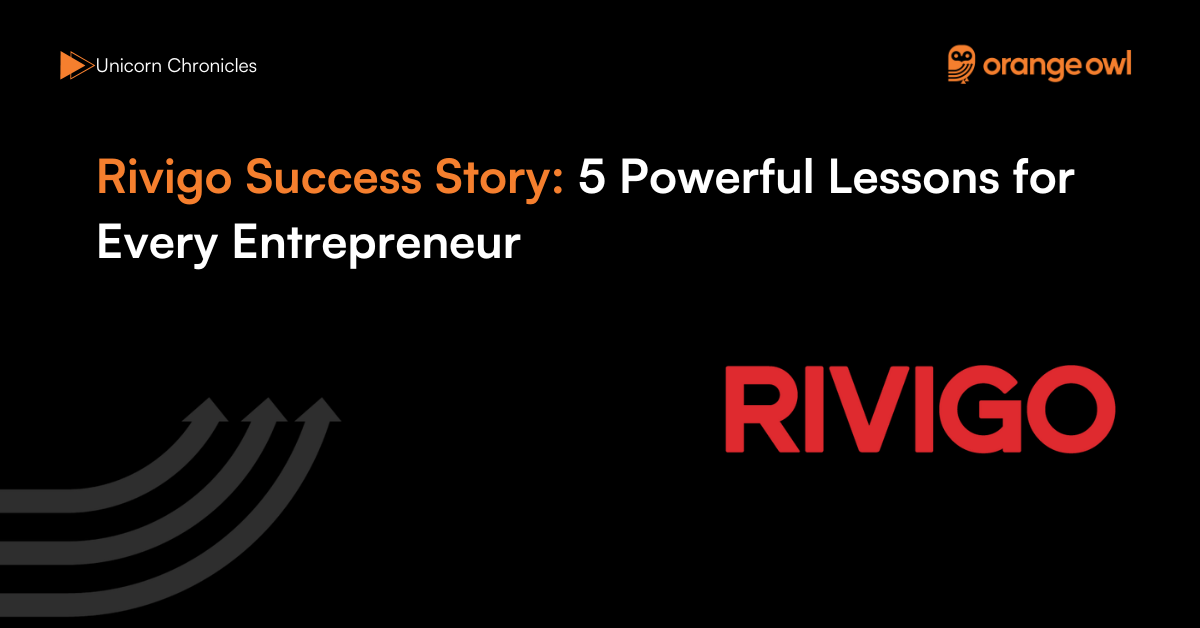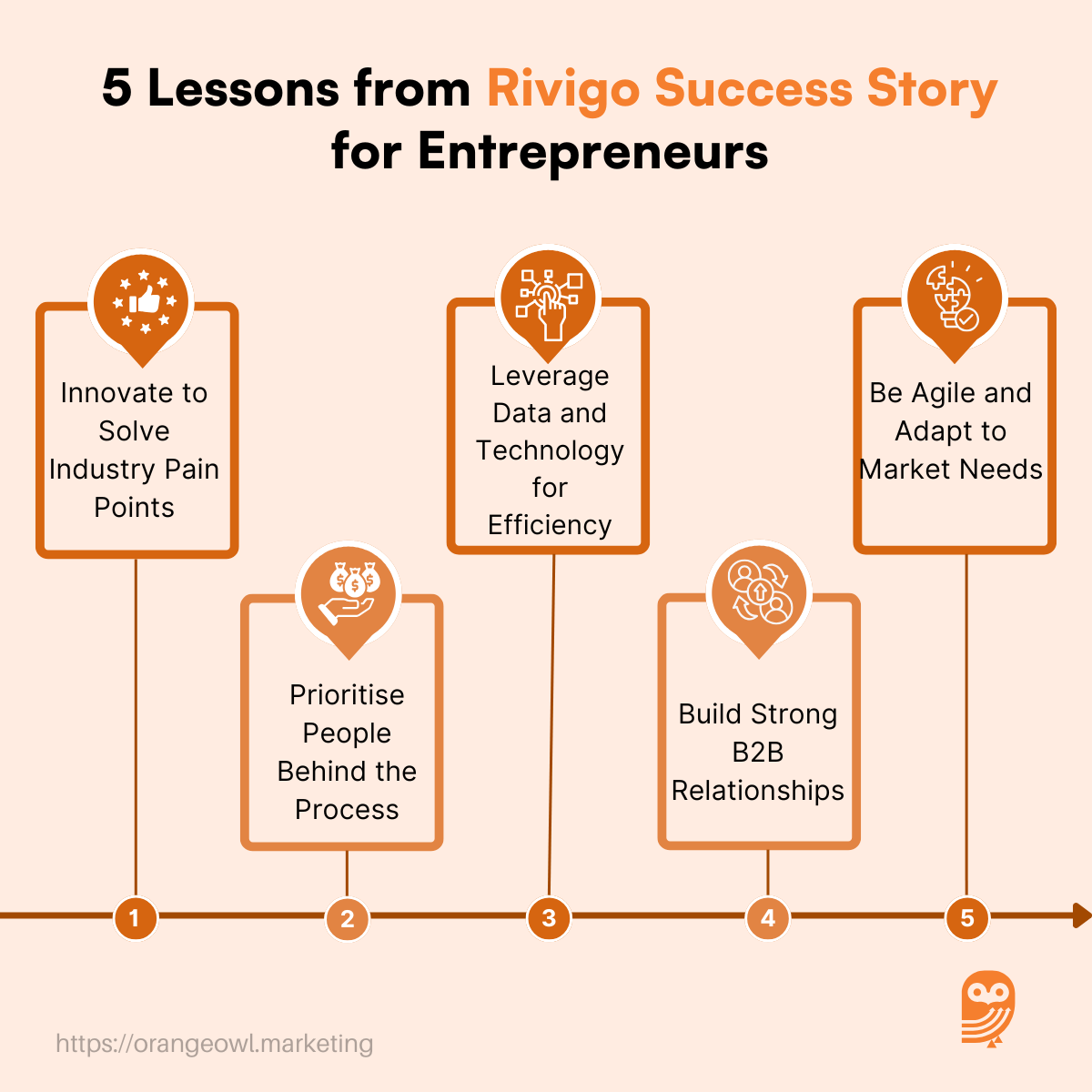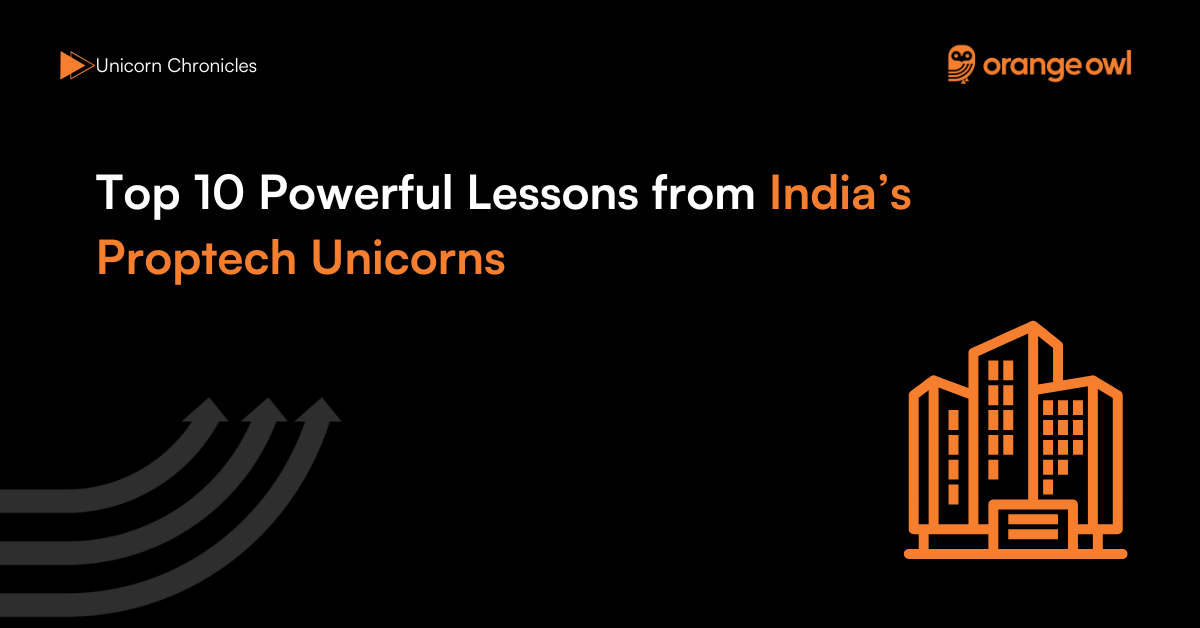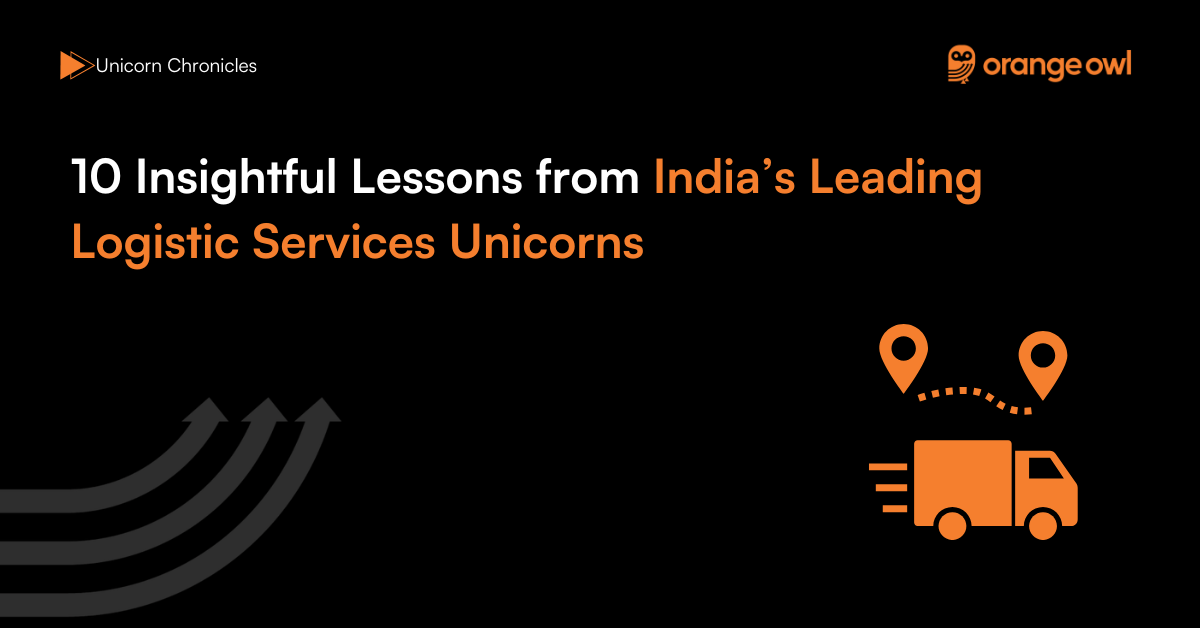Rivigo Success Story: 5 Powerful Lessons for Every Entrepreneur
Vivek Goel
June 17, 2025

Table of Contents
Introduction
In a country where logistics is the backbone of commerce and millions of trucks crisscross thousands of kilometres daily, Rivigo has emerged as a revolutionary force transforming India’s trucking industry. Founded in 2014 by Deepak Garg and Gazal Kalra, Rivigo set out with a mission to solve the critical problems of driver shortage, long delivery times, and inconsistent schedules that plagued traditional trucking. What began as a bold experiment with relay trucking soon grew into a game-changing model that leveraged technology, data, and innovation to make long-haul logistics faster, safer, and more reliable.
Over the years, Rivigo has built a tech-enabled logistics platform that operates thousands of trucks across India, connecting businesses with real-time freight solutions. Its unique relay system allows drivers to cover long distances without fatigue, improving turnaround times and driver well-being. In 2019, Rivigo achieved unicorn status with a valuation of over $1 billion, marking a significant milestone in its journey. As of 2024, Rivigo manages over 100,000 shipments a month, reducing delivery times by up to 50% on key routes. The company’s relentless focus on efficiency and driver empowerment has positioned it as a trailblazer in India’s supply chain sector.
The Rivigo success story is perfectly captured by Deepak Garg’s words: “We wanted to bring dignity and technology to trucking.” Rivigo’s journey is not just about logistics; it’s about transforming an age-old industry with innovation, creating value for customers, and uplifting the lives of thousands of drivers who power India’s economy.
Origin Story
The genesis of Rivigo began with Deepak Garg and Gautam Garg, two brothers determined to solve the deeply entrenched inefficiencies and human costs of India’s logistics industry. Deepak, an alumnus of IIT Delhi and an MBA graduate from ISB, had firsthand experience with the challenges faced by truck drivers during his time working in the corporate sector. He witnessed the gruelling long-haul journeys, driver fatigue, and high turnover rates that plagued the industry.
Inspired to bring a human-centric innovation to logistics, the brothers launched Rivigo in 2014 with a bold vision: to build a tech-enabled trucking relay platform that prioritised driver well-being and operational efficiency. Their idea was revolutionary — a relay system where drivers would cover short distances before handing over trucks to fresh drivers at relay points, drastically reducing fatigue and improving safety.
Deepak Garg has often emphasised this unique approach by saying,
“We wanted to build a company where drivers are partners, not just employees.”
This focus on driver welfare, combined with cutting-edge technology and data analytics, allowed Rivigo to challenge the status quo of India’s fragmented trucking industry.
From its early days operating just a handful of trucks, Rivigo rapidly scaled its network, leveraging automation and real-time tracking to improve turnaround times. The company’s relentless innovation and commitment earned it unicorn status in 2019, making it one of India’s standout logistics startups.
As Deepak reflects, “Logistics is not just about moving goods; it’s about moving people’s livelihoods and trust.”
Rivigo’s origin story is one of vision, empathy, and disruption, illustrating how a deep understanding of ground realities can fuel transformative change in a traditional sector.
Business Space and Early Challenges
Rivigo entered a traditionally fragmented and inefficient logistics sector in India, which heavily relied on long-haul trucking with outdated practices. The industry faced significant challenges such as driver fatigue, high turnover, long delivery times, and a lack of technological integration. The absence of a sustainable model for driver welfare and efficient freight movement made logistics one of the most challenging sectors for innovation.
One of Rivigo’s earliest hurdles was to build trust and reliability in an industry that had long operated on informal networks and fragmented service providers. Convincing truck drivers and fleet owners to adopt the novel relay system required educating stakeholders about its benefits — reduced fatigue, better driver health, and faster deliveries.
The operational complexity of setting up relay points across vast geographies posed logistical and technological challenges. Coordinating seamless handovers between drivers without delays or damage to cargo demanded precise data-driven scheduling and real-time tracking.
Deepak Garg reflects on these early struggles:
“The biggest challenge was changing mindsets — from seeing drivers as just labour to seeing them as partners in the journey.”
Furthermore, integrating technology into a largely traditional supply chain ecosystem meant Rivigo had to build robust software capable of real-time freight monitoring, predictive analytics, and automated dispatch. This technology backbone was critical to ensuring efficiency at scale.
Despite these challenges, Rivigo’s commitment to driver welfare, coupled with its technology-first approach, allowed it to carve a unique space in India’s logistics market, setting new standards for delivery speed and reliability.
Growth Strategies
Rivigo’s remarkable growth has been driven by its innovative relay trucking model, deep operational efficiency, and relentless focus on technology integration. Unlike traditional logistics companies that rely on long-haul drivers completing entire routes, Rivigo pioneered a relay system where drivers hand over trucks at designated pit stops. This innovation not only dramatically reduces driver fatigue but also improves delivery speed and driver retention, creating a sustainable competitive advantage.
At the heart of Rivigo’s growth strategy is a technology-first approach. The company built a robust digital platform that offers real-time tracking, route optimisation, and predictive analytics. This data-driven system enables precise scheduling and better asset utilisation, helping Rivigo deliver goods up to 50% faster on major routes. Their tech platform also provides transparency and visibility to customers, building trust and strengthening client relationships.
Rivigo also prioritised driver welfare as a core pillar of its growth. Offering benefits like regular shifts, better working conditions, and healthcare support reduced driver turnover, an industry pain point. By treating drivers as partners rather than mere labourers, Rivigo created a motivated workforce that contributed to improved service reliability and operational scalability.
Strategic investments in infrastructure development were essential. Setting up relay hubs across India’s vast geography enabled seamless driver handovers and quick turnaround times. These hubs also function as support centres for maintenance and driver rest, ensuring uninterrupted supply chain flows.
Expanding its service portfolio was another key growth lever. Rivigo diversified into express cargo, cold chain logistics, and specialised freight solutions to capture wider market segments. Partnerships with large enterprises in sectors like e-commerce, manufacturing, and pharmaceuticals accelerated customer acquisition and revenue growth.
Founder Deepak Garg emphasises this holistic strategy:
“Our goal was not just faster deliveries, but building an ecosystem where technology, people, and processes come together to redefine Indian logistics.”
By combining technology, human-centric policies, and infrastructure, Rivigo has successfully transformed traditional trucking, achieving unicorn status and scaling operations to manage over 100,000 shipments monthly.
Marketing Strategies
Rivigo’s marketing strategy is anchored in building trust and demonstrating reliability in an industry traditionally plagued by inefficiencies and delays. One of its most effective approaches has been leveraging technology as a brand differentiator, highlighting its relay trucking model and real-time tracking capabilities to position itself as a logistics partner that delivers speed and transparency.
The company invested heavily in B2B marketing, targeting large enterprises across sectors like e-commerce, manufacturing, and pharmaceuticals. Rivigo built strong relationships with key decision-makers by showcasing case studies that quantified benefits such as faster delivery times, reduced freight damage, and lower driver attrition. This consultative selling approach helped establish Rivigo as a preferred logistics partner for high-volume shippers.
To extend its reach and build brand awareness, Rivigo used thought leadership through industry conferences, whitepapers, and media appearances by founder Deepak Garg. Sharing insights on supply chain innovation and driver welfare helped Rivigo shape its image as a forward-thinking company committed to transforming Indian logistics.
Rivigo also deployed targeted digital campaigns focused on recruitment and driver engagement, recognising that a motivated workforce was key to service excellence. Campaigns highlighting driver benefits and career growth attracted quality talent and reinforced Rivigo’s reputation as a driver-first company.
In addition, the company nurtured strategic partnerships with industry bodies, government agencies, and technology providers to expand its network and leverage ecosystem synergies. These collaborations enhanced Rivigo’s market credibility and supported growth in new verticals like cold chain and express cargo.
Founder Deepak Garg summarises this approach:
“Our marketing is less about loud advertising and more about building trust through innovation, transparency, and partnership.”
This multi-pronged marketing strategy helped Rivigo scale rapidly while maintaining a strong brand promise of speed, reliability, and driver empowerment.
5 Powerful Lessons for Every Entrepreneur
1. Innovate to Solve Industry Pain Points
At its core, Rivigo’s success stems from addressing a fundamental challenge in logistics: driver fatigue and long delivery times. Its relay trucking model was not just an incremental improvement but a bold innovation that redefined how goods move across India. This innovation drastically improved operational efficiency and customer satisfaction.
Entrepreneurs can learn that deep, sector-specific problems demand creative, tailored solutions rather than one-size-fits-all fixes. The lesson is to dig deep into pain points and reimagine processes to create truly disruptive business models.
2. Prioritise People Behind the Process
Rivigo’s focus on driver well-being—through regular breaks, health support, and incentives—transformed a typically tough job into a sustainable career. This emphasis on human capital created loyalty and operational stability, reducing turnover and improving service consistency.
The lesson here is that scaling a business means nurturing the people who power it, as their engagement directly impacts service quality and growth. Treating employees with respect and care often becomes a competitive advantage in labour-intensive industries.

3. Leverage Data and Technology for Efficiency
Rivigo integrates IoT devices, AI-driven route optimisation, and real-time tracking to maximise fleet utilisation and transparency. This data-driven approach improved delivery speed and reliability, helping build trust with customers and partners.
Entrepreneurs should see technology as a tool not just for automation but for creating smart, efficient ecosystems that adapt dynamically to changing conditions. Investing in tech infrastructure pays off by driving continuous improvement and operational excellence.
4. Build Strong B2B Relationships
Rivigo’s growth was anchored in its ability to build lasting partnerships with enterprises by delivering consistent value and customised solutions. This helped secure large contracts and foster trust in a fragmented market where reliability is rare.
Entrepreneurs should prioritise customer relationships, focusing on reliability and tailored service to differentiate themselves. Long-term partnerships enable more predictable revenue and open doors for collaboration and innovation.
5. Be Agile and Adapt to Market Needs
Rivigo’s expansion into new verticals like cold chain logistics and its responsiveness to fluctuating demand showcase its agility. By continuously innovating and adapting, Rivigo stayed ahead in a competitive market and met evolving customer expectations.
Entrepreneurs must embrace flexibility and quick iteration as vital tools for sustainable success. Being open to pivoting and expanding based on market feedback can reveal new growth opportunities that were not apparent initially.
Conclusion
The Rivigo success story is a compelling example of how innovation, empathy, and technology can revolutionise a traditional industry like logistics. By reimagining the trucking ecosystem with its unique relay model, driver-first approach, and data-driven operations, Rivigo has not only improved efficiency but also created a more humane and sustainable work environment. This blend of purpose and pragmatism helped Rivigo scale rapidly across India’s vast and complex logistics landscape.
Rivigo’s journey underscores the importance of understanding ground realities and addressing them with bold, tailored solutions rather than generic fixes. Its ability to build strong partnerships, leverage technology for operational excellence, and stay agile in the face of market changes has made it a trailblazer in the logistics sector.
For entrepreneurs, the Rivigo success story offers valuable lessons on innovation with impact, putting people at the heart of the business, and using technology not as an end but as an enabler for meaningful change. Ultimately, Rivigo exemplifies how startups can transform entire industries while creating value that goes beyond profits, reshaping the way India moves.


